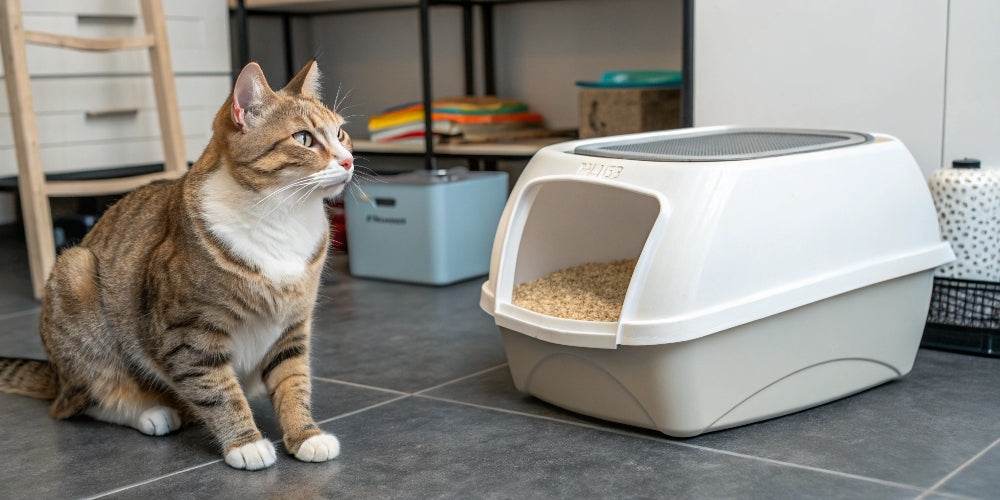
Tips for caring for your cat's litter box
Our feline friends are very clean animals who generally require higher levels of hygiene than other domestic animals, such as dogs. Therefore, you should pay special attention to their care and provide them with everything they need to ensure they have a quiet, clean space to relieve themselves.
If it's your first time having a cat at home or you still haven't mastered all the hygiene issues for your furry friends, you'll surely be interested in knowing How to clean your cat's litter box properly, among many other questions. In this article, we'll answer some of the most frequently asked questions and cover several points that will surely help you when performing your cleaning tasks. Keep reading!
How often should you clean the cat's litter box?
This is the first thing you should know. It is advisable to remove feces and urine. at least once a day.
On the other hand, it should be noted that the cat litter It must be completely changed over a period that can range 2 to 4 weeksHowever, it all depends on how often you use it. One factor to keep in mind is when the litter box is used by more than one cat, as this will significantly reduce the use, as it will get dirty more quickly and you'll need to change it sooner.
Maintaining your cat's litter box is easier than it seems. Our recommendation is that incorporate the habit of checking and cleaning into your routineFor example, you can check the litter box every time you get home from work to see if your furry friend has done anything, clean up the day's feces, and take the opportunity to add or change the litter if necessary.
How to clean the litter box?
At the time you go to change the sand, you should also wash and disinfect the litter boxTo do this, we recommend wearing gloves to prevent hygiene products from damaging your cat's skin. Also, keep in mind that some cleaning products on the market can negatively affect your cat's health, so it's best to buy ones that are safe for this type of task.
One of the most common alternatives is to put bleach and soap inside the litter box, along with hot water. The effects of both products will help us thoroughly clean and disinfect the litter box. After 5-10 minutes, rinse the box with plenty of water and wipe it with a cloth to dry it thoroughly. Once this process is complete, you can refill the litter box with your usual litter.
How do I control odors in my cat's litter box?
The smell of our cat's urine and feces can be very unpleasant. If you don't know where to start, here are some tips recommended by the Arquivet team:
- Clean your cat's litter box every day: As we mentioned a moment ago, incorporating the habit of checking and cleaning your cat's litter box every day into your routine is the best thing you can do. Your furry friend will appreciate it, as they love their "bathroom" area to be as clean as possible. At the same time, you'll prevent feces or urine from staying in the same place for too long, thus avoiding unpleasant odors. A good time to do this might be in the morning, before going to work, or right after returning. Some people prefer to do it before going to sleep. It's up to you.
- Choosing the right sand: There are several types and you're probably wondering which is the best cat litter. The truth is, there isn't just one option. However, it's worth noting that clumping cat litter works especially well for odor control. Other options such as scented sands or silica sands, which absorb liquids very well, will also be a safe bet, thus avoiding unpleasant scents. Keep in mind that a premium cat litter will always be a good ally in these cases.
- Use covered or self-cleaning litter boxes: Closed litter boxes allow for effective odor control, as the cat defecates or urinates in a more covered area, thus eliminating the risk of odors spreading throughout the room. There are also self-cleaning litter boxes, which make cleaning much easier by removing the cat's solid waste from the litter box and placing it in a plastic bag, usually located at the bottom.
- Change the litter frequently: If you change the litter frequently, you're less likely to experience this type of problem. If you leave the litter in the box for too long, it will lose its absorbent and odor-controlling effectiveness, as the material degrades more frequently and over time. You can try changing the litter at least once every two weeks, and if the problem still persists, reduce the time to once a week.
How to recycle cat litter?
In general, cat litter is not recyclableIt's best to separate the pet waste balls, place them in a plastic bag, and dispose of them in the waste container. To do this, you can use a plastic scoop to help you avoid getting dirty or spreading waste all over the litter box. Keep in mind that flushing this type of waste down the toilet is also not recommended, as it can cause blockages in the pipes.
How often should you change your cat's litter box?
Changing the litter box isn't as frequent as changing the litter itself. The most important thing is that the litter box your cat will use is in good condition and free of any cracks, as this could cause injury to your furry friend at some point during use. If the litter box is of medium to high quality, it can last several years.


